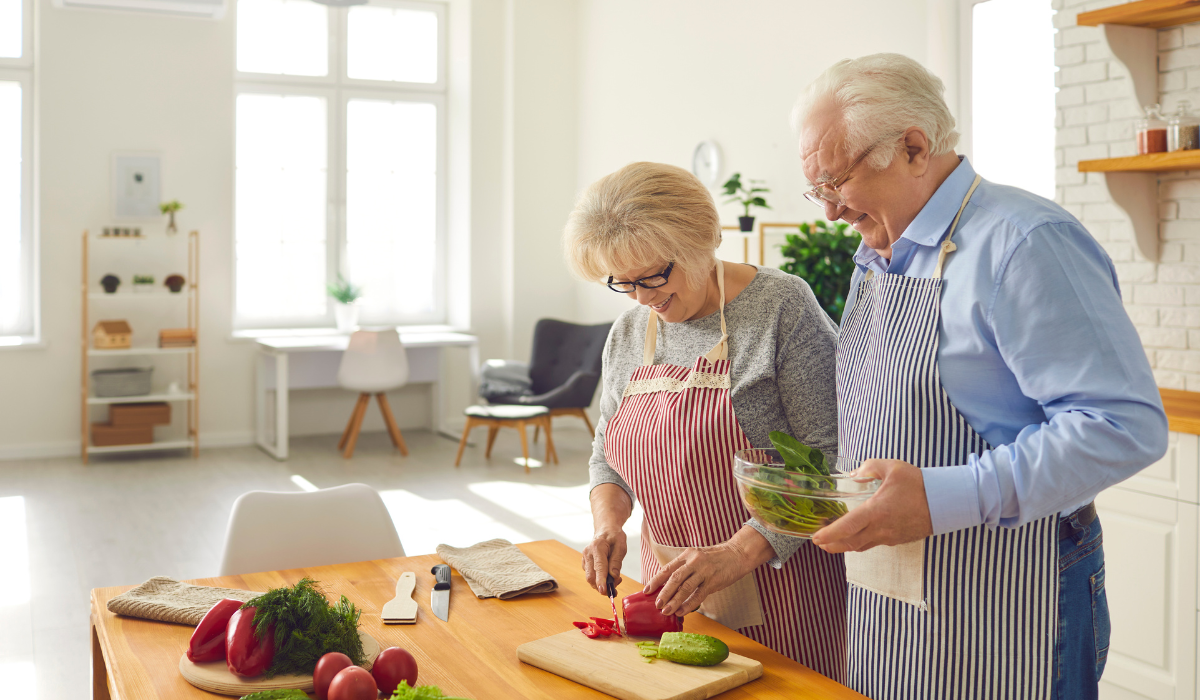As we get older, healthy living at home becomes even more critical. Regular activity, healthy eating, and stimulating the mind can enhance the quality of life and maintain independence. The good news is that it takes only small, achievable changes to make a big impact. Older adults can stay comfortably and happily at home with a few simple habits.
Why Healthy Living Matters for Older Adults
Aging is a natural process, but how we age is up to us. Healthy living at home isn’t about staying well from illness—it’s about feeling good, being active, and enjoying life. Simple daily habits can make a big difference in overall health. The CDC says that almost 80% of adults aged 65 and older have at least one chronic condition, but healthy living can help control or even prevent many health problems.
Creating a Safe and Comfortable Home Environment
A safe home lowers the risk of falls, injury, and stress. Here’s how to make your home senior-friendly:
- Eliminate hazards – Clear floors and anchor rugs to avoid tripping.
- Improve lighting – Make sure hallways, stairways, and rooms are properly lit.
- Add support features – Non-slip mats and grab bars in the bathroom can provide additional protection.
- Store essentials at hand level – Steer clear of over-reaching or over-bending for daily necessities.
Nutritious Eating Habits for Seniors

Healthy eating maintains energy, immunity, and mental function. A few easy adjustments include
- Prioritize whole foods – Fresh vegetables, fruits, lean proteins, and whole grains should be the focus.
- Stay hydrated – Dehydration is prevalent among the elderly. Have at least 8 cups of water per day.
- Restrict processed foods – Prevent too much salt, sugar, and unhealthy fat.
- Think about portion sizes – As metabolism decreases, smaller, more nutrient-dense meals are ideal.
Staying Physically Active at Home
Movement is the key to remaining strong and independent. A little exercise can make a difference. Try these simple activities:
- Chair exercises – Perfect for those with limited mobility.
- Walking – Even a short walk around the house or backyard can make a difference.
- Gentle stretching – Helps maintain flexibility and reduces stiffness.
- Strength exercises – Lifting light weights or using resistance bands can prevent muscle loss. According to the National Institute on Aging, just 30 minutes of daily activity can reduce the risk of chronic diseases by 40%.
Mental Well-being and Cognitive Health
A healthy mind is as essential as a healthy body. Below are tips to maintain a sharp brain:
- Stay mentally active – Read, do puzzles, or take up a new hobby.
- Practice mindfulness – Meditation and deep breathing can alleviate stress.
- Stay connected socially – Video calling, telephone calls, or internet forums can avert loneliness.
- Sleep well – Lack of sleep can worsen memory issues and mood swings.
The Importance of Hydration and Proper Sleep
Sleep and hydration are the most underrated but essential factors in general well-being.
- Drink water daily – Target no less than 6-8 glasses, and add hydrating foods such as cucumbers and oranges to your diet.
- Establish a bedtime routine – Maintain a regular sleep schedule to enhance sleep quality.
- Steer clear of caffeine in the evening – This can interfere with sleep cycles.
- Keep the bedroom warm – A quiet, dark bedroom at a low temperature supports better sleep.
Building Social Connections from Home
Social relationships increase happiness and mental well-being. These are means to remain connected:
- Participate in online forums – Senior groups have virtual meetups and chats.
- Remain connected to family – Messages and video calls keep people in touch.
- Get a pet – Pets offer companionship and can promote exercise.
- Engage in hobbies – Gardening, knitting, or music can be fun and sociable.
Managing Chronic Conditions and Medications
Effective management of health enhances quality of life. Remember these:
- Take medicines as directed – Use a pill box to keep track.
- Visit virtual or in-person doctor visits – Routine check-ups avoid complications.
- Track important health markers – Monitor blood pressure, blood glucose, or weight.
- Stick to a routine – Regularity in diet, exercise, and rest controls health conditions.
The Role of Hobbies and Leisure Activities
Participating in fun activities maintains the mind and body engaged. Some good ones are:
- Art and crafts – Painting, knitting, or pottery can be soothing and rewarding.
- Music and dance – Singing or light dancing will enhance mood and coordination.
- Gardening – Offers light exercise and fresh air exposure.
- Journaling or journaling – Assists in self-expression and memory.
Conclusion
Healthy living at home is all about balance—good eating, exercise, stimulating your mind, and spending time with family. Every day brings the chance for a healthier, longer, and happier life. If it’s just modifying your eating habits, being more active, or even enjoying a hobby, it all matters. Begin now and reap the rewards of a healthy life at home!
FAQ’s
What are the easiest exercises for older adults at home?
Gentle stretching, chair exercises, and brief walking are excellent for staying active without straining.
How can seniors maintain good mental health at home?
Reading, puzzles, meditation, and socializing keep the mind engaged and stress-free.
What are some healthy snacks for older adults?
Nuts, yogurt, fruits, and whole-grain crackers give a boost of energy and nutrition without being too heavy on the body.
How much sleep do older adults need?
Most older adults require 7-9 hours of quality sleep for optimal health and well-being.






